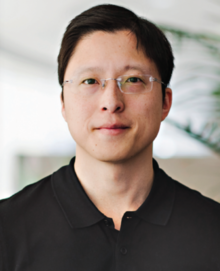Waterloo Engineering spinoff recognized by United Nations for sustainable AI innovation
A company that was co-founded by two Waterloo Engineering professors has been recognized by an agency of the United Nations (UN) for its contributions to a state-of-the-art facility to farm crickets as a source of protein.
DarwinAI and the Aspire Food Group, which is leading the initiative, were named to a list of the top 10 projects using artificial intelligence (AI) to advance the UN’s sustainability goals.
"It’s been inspiring to work on such a visionary project that brings artificial intelligence into tangible, meaningful reality, given the increasing global demand for sustainable solutions for food and material production,” said Alexander Wong, who is leading the design and development of AI algorithms for the facility.

Alexander Wong is a systems design engineering professor and co-founder of DarwinAI.
“The hope is to work with DarwinAI to scale this solution with Aspire Food Group as the number of automated production facilities grows around the world.”
Aspire is working with several industry partners, including Waterloo-based DarwinAI, on a facility in London, Ontario expected to be the largest fully automated cricket production and processing operation in the world.
DarwinAI, co-founded by Wong, a systems design engineering professor, and research professor Mohammad Javad Shafiee, is contributing automated visual inspection and explainable AI with Internet of Things (IoT) sensor data analysis to optimize yield and provide insight into plant conditions and operations.
The facility is expected to open later this year. Aspire aims to deploy the pioneering modular production system around the world.
“A growing population and increasing demand for food and material requires sustainable, scalable solutions,” Mohammed Ashour, the CEO Aspire, said in a media release today.
The DarwinAI/Aspire project is one of only two from North America to make the top 10 after the International Research Center in Artificial Intelligence (IRCAI), which operates under the auspices of the United Nations Education, Scientific and Cultural Organization (UNESCO), issued a call last year for solutions with global relevance.
'Transformative potential'
The other North American project to received recognition was submitted by the National Aeronautics and Space Administration (NASA).
“This important distinction speaks to the breath of Aspire's vision and the transformative potential of artificial intelligence, and it is a privilege to apply our technology to such a forward-looking initiative,” Sheldon Fernandez (BASc ’01, computer engineering), a Waterloo alumnus and CEO of DarwinAI, said in the release.
The top 10 projects are expected to be highlighted by the IRACI at a press conference in New York next month.
The cricket facility is backed by $16.8 million in funding from Next Generation Manufacturing Canada (NGen), which is financed through the Canadian government’s supercluster initiative.
Farming crickets for food was originally posted in Waterloo News.